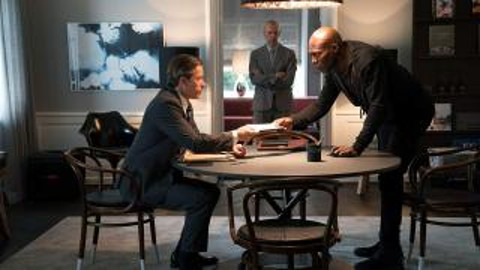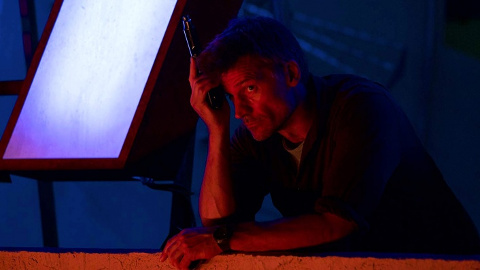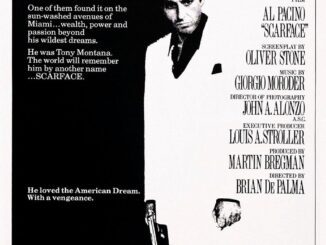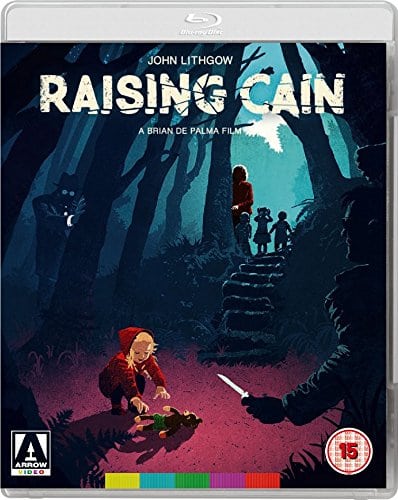Domino (2019)
Directed by: Brian De Palma
Written by: Petter Skavlan
Starring: Carice van Houten, Eriq Ebouaney, Guy Pearce, Nikolaj Coster-Waldau
Denmark/France/Italy/Belgium/Netherlands
AVAILABLE ON BLU-RAY AND DVD
RUNNING TIME: 89 mins
REVIEWED BY: Dr Lenera, Official HCF Critic
In Copenhagen, cops Christian Toft and Lars Hansen are longtime partners, connected emotionally and professionally. Called to a crime scene late one night, Christian forgets his gun, soon requesting a firearm from Lars after they arrest Erza Tarzi, who seems to have murdered someone. But Ezra frees himself, cuts Lars’s throat and flees before being captured by the CIA. With Lars in the hospital, Christian is ready to exact revenge with the aid of Alex, a friend of Lars’s. But CIA Agent Joe Martin wants Ezra to track down Al-Din, a Libyan ISIS butcher responsible for killing Erza’s father, and he won’t release Ezra’s family until he does so….
It’s been rather frustrating being a Brian De Palma fan for some time now. With his glory days well and truly gone, he every now and again keeps himself busy with productions which are seriously flawed, yet which are still sort of interesting and which contain flashes here and there of the old magic. Of course one should probably not expect the 79-year old filmmaker to still retain all of his former energy, and it’s understandable that, quite often, it’s in the nature of directors who were formerly extremely stylish in their filmmaking [Dario Argento is is another example, though so far De Palma has never made anything quite so poor as Mother Of Tears] to adopt a more straightforward style in their later years. But it’s now been six years since his last film Passion, and for a while I wondered whether Domino was ever going to get completed. It was a problematic production, with frequent delays owing to budget cuts and many crew members not even getting paid for ages, then the Danish producers decided to drag their heels in releasing it. It was circulated that De Palma had the film taken off him and re-cut, though De Palma later claimed that this was not true. He was not involved in the final stages of post production though. He has said that the movie is “very good”, though has also tried to distance himself from it in interviews. Like his last four efforts, it didn’t get a cinema release in the UK, though of course that’s not necessarily a sign of a film being bad.
Well Domino is, to be frank, pretty much what I expected in terms of quality. For much of its length, it’s a pretty run of the mill thriller, but is book-ended by opening and closing sections that are terrific, full of that bed-wetting tension and mastery of film craft that drew many of us [well, that and all that blood] to the work of this sometimes brilliant filmmaker in the first place. Though this probably wasn’t the case, it’s as if De Palma shot those bits first, devoting much time and energy as he did so, than either just sat back and winged it or gave the job of filming the rest to another filmmaker. Honestly, the disparity is considerable. In fact the film doesn’t even seem quite finished, with some connective tissue that appears to be missing and even a few scenes that don’t seem to have been completed. It’s De Palma’s second film in recent years to be topical. Most of his films don’t even attempt to relate to what’s going on in the real world, but 2007’s Redacted directly concerned itself with American war crimes in Iraq, and this one handles the subject of Islamic terrorism. I reckon that, if it had had a major release, some people , the kind who who want all villains in movies to be American or British, would be whinging that it’s anti-Muslim just because it depicts some ISIS scum as they are – though in a way that might have been a good thing as it would have garnered the film more attention. But it seems that the days when a new De Palma film gets many film lovers all excited are long gone.
So we’re in Copenhagen – at least for a while – and, while it used to be the case all the time, it’s become strange having a modern film set in another country where everyone speaks English. We join best buddies and work colleagues Christian and Lars in a cafe. Lars is seemingly happily married, though that night he sits alone in the dark in his lounge with a drink pondering on something. Christian, on the other hand, has a date which has a very passionate outcome, though he needs to get up extremely early while it’s still dark due to his job. As he’s lured by his woman into one last bit of fun, the camera zooms in his gun in an almost amusingly obvious example of foreshadowing. He and Lars begin their patrol and answer a call to a “domestic dispute”, leading to a fantastic ten minutes or so, at least in terms of film-making. In hindsight one is left with questions. It’s odd how an experienced cop forgets his gun, while another experienced cop fails to correctly apply handcuffs to a suspect, then turns his back to this violent and strong suspect in front of a giant window. But as you watch it’s exhilarating seeing De Palma back working, if not at his best, certainly with much of the old spark. The two cops arrest a man named Ezra who has blood on his shoes, then Christian is led by bloody footprints to a dead body while Lars is left with Ezra. We get two lingering split diopter shots of the faces of Ezra and Lars as the tension is drawn nicely out, before Ezra slashes Lars and is chased by Christian on rooftops, a sequence shot with lots of unusual angles, as well as allowing De Palma, still no doubt a Hitchcock fanatic [well why not, I am too], to reference Scottie in Vertigo hanging on to that rooftop. Of course you may question why Christian would leave his partner who has a serious chance of bleeding to death to risk his life in such a fashion. But things are still good when hunter and quarry fall [conveniently, I admit] into boxes of fruit and a concussed Christian is just about able to make out Ezra being tasered and carted off.
Now the film brings in the CIA part of the story, and this may have benefited from being introduced later on so that we don’t have to watch Christian stumble about in the dark trying to discover stuff that we already know. The CIA get a healthily unflattering portrayal. They don’t want to get their hands dirty [for once], so Agent Martin, played by Guy Pearce as the usual smarmy git he tends to appear as these days, forces Ezra to track down the evil terrorist Al-Din by holding his family to ransom, and also by forcing a teenage boy to almost reveal him as a killer [I think – it’s not totally clear] in the first of several scenes or plot elements that don’t seem to be fully thought through. So both Christian [even though he’s been taken off the case] and Ezra are soon separately hunting down the same quarry through Europe, resulting in a few minor fights and deaths but nothing too exciting. De Palma seems more interested in Al-Din and his group’s penchant for suicide bombing, notably a sequence shown on a laptop’s split-screen with the female bomber on the left and her point of view on the right as she guns down people at a fashion show. While not particularly stylised, it’s quite nasty [if partly due to believable nature of it] and shows that De Palma still has it in him to shock even though his gleefully naughty censor-baiting days seem to be well behind him. And then there’s the fabulous climax set at a bull-fight. In the past, De Palma has put together some terrific suspenseful set pieces in crowded public spaces, just think of particular scenes in the likes of Blow Out, The Untouchables, or Carrie where characters are always attempting to carry out evil plans and other characters are attempting to stop them. While this one relies partly on a rather silly device, that of a drinks vendor who won’t sell anything, it still works very well in winding the viewer up and demonstrating pure mastery of cinema, with all the expected devices, from cross cutting to slow motion, present and correct. It’s just a shame that the resolution leaves so much hanging.
In fact as I type, I’m left with so many questions, such as Ezra himself. I’m guessing that he was a murderous terrorist himself, but the script isn’t clear, as it isn’t about a lot of things that I won’t go into otherwise I’d give the entire plot away. Of course ambiguity and lack of explanation for things can work well, but here one is left with the impression that De Palma filmed an early draft of the script. Carelessness affects many moments. Christian walks right through a crime scene in his own shoes even though the CSI are all in masks and gloves with shoe covers. Later on he tries to board an airplane with a loaded gun – and then just leaves it the security check [though he seems to have at the climax]- I can’t think why this scene was even written let alone filmed. And what are the chances of booking a flight to “anywhere in southern Spain” at a seemingly random time and ending up running into the bad guys almost immediately? At least the always charismatic Nikolaj Coster-Waldau brings a likeable world weary element to the character of Christian, and fellow Game Of Thrones alumnus Carice van Houten does her best to make the most of the very poorly written part of Lars’s friend Alex who accompanies Christian in his quest. Far too much is spent on a not especially surprising revelation concerning this character, though the film is never actively boring – in fact it really needed to be longer in order to clarify a lot of things. It’s just very average in between those fine opening and closing sections where even the lighting becomes striking, with faces repeatedly bathed in orange and a neon sign illuminating a whole room below it in blue. The cinematographer is Jose Luis Alcaine, in my opinion one of Spain’s top lensers who’s worked a lot with Pedro Almovador and who did De Palma’s Passion. He obviously decided to rise to the occasion exactly whenever De Palma did!
Some may find the music by Pino Donnagio to be overbearing and overused. Donaggio scored some of De Palma’s older classics and his very baroque style tended to suit those, but, while I personally relished a modern film score that was mixed loud and which played a major part in telling the story, Donnagio isn’t much good with the catchy themes any more and there are times where the score doesn’t match the visuals much. However, it’s nice to have the score’s best piece, a Middle-Eastern-tinged bolero, be played in full by a visible orchestra during the bullfight sequence, thereby functioning as both source music and score. De Palma lovers will undoubtedly find a few nuggets to hold on to with Domino, as I certainly have, but truth be told there isn’t really much in it for the general viewer who just fancies a tense thriller and may find the occasional strange touches out of place. But it does prove that this director is still able to deliver the goods, if very sporadically. As with fans of Argento [I’m one of those too – at least until around a decade and a half ago or so], it’s all terribly frustrating. I’m sure I’m not alone in wishing that De Palma has one more movie in him, maybe in the horror genre which for a while way back in the day he showed a real mastery of, where he’s fully focused and can show all these young pups how it’s really done.










Be the first to comment